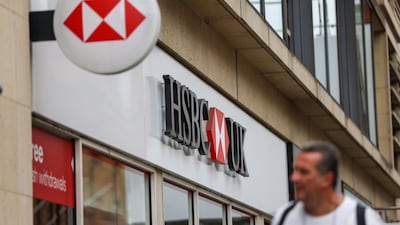HSBC, Europe's largest lender, said profit before tax in the second quarter remained stable as a rise in revenue and net interest margin helped it to offset an increase in charges for expected loan losses amid mounting global economic uncertainty.
Pre-tax income for the three months to the end of June stood at $5.01 billion, slightly lower than the $5.06bn reported at the end of the same period last year, the lender said on Monday.
Reported revenue for the April-June period increased by 2 per cent to $12.8bn, primarily reflecting interest rate rises.
Net interest margin climbed 1.35 per cent, a 9 basis point increase from the first quarter of this year.
Adjusted profit before tax increased 13 per cent to $6bn, beating the $4.96bn analyst estimate in a Bloomberg survey.
The bank's pre-tax income for the first six months of the year dropped by $1.7bn to $9.2bn.
The drop reflects a $1.1bn net charge for expected loan losses, underpinning weakening global growth momentum and inflation.
However, the half-year profit beat the $8.15bn average estimate of analysts compiled by HSBC.
“Our first-half performance reflects the continued impact of our strategy, with gathering revenue momentum and tight cost control,” said group chief executive Noel Quinn.
“The progress that we have made growing and transforming HSBC means we are in a strong position as we enter the current rates cycle.”
The lender, which announced a $1bn share buyback in February, scrapped its plans as its first quarter pre-tax profit slumped amid a slowing global economy.
Further share-buy backs “remain unlikely” in 2022, HSBC said on Monday.
Rising energy prices and supply chain disruptions, driven in part by the continuing conflict in Ukraine, have dented the global recovery from the coronavirus-induced economic slowdown.
Last week, the International Monetary Fund lowered its growth forecast for the global economy for the second time this year due to rising inflation and a slowdown in China.
The fund now expects the world economy to expand by 3.2 per cent in 2022 and 2.9 per cent in 2023, revising it down by 0.4 percentage points and 0.7 percentage points from its April forecast, respectively.
This compares with a 6.1 per cent expansion last year.
The fund issued a warning that if further risks materialise and inflation rises further, global growth could decline to about 2.6 per cent and 2 per cent in 2022 and 2023, respectively, which would put growth in the bottom 10 per cent of outcomes since 1970.
However, despite headwinds, HSBC updated its near-term guidance on return on tangible equity to at least 12 per cent from 2023 onwards.
“The impact of our growth and transformation programmes over the last two years has given us the confidence to update our returns guidance,” the lender said.
It also plans to restore quarterly dividend payouts next year. Given the current return trajectory, it expects a dividend payout ratio of about 50 per cent for 2023 and 2024.
“We understand and appreciate the importance of dividends to all of our shareholders. We will aim to restore the dividend to pre-Covid-19 levels as soon as possible,” Mr Quinn said.
HSBC, which is increasingly focused on Asia to drive income, said all its regions were profitable in the first half.
Its Asia business delivered adjusted profits of $6.3bn, despite the impact of Covid-19 in some of its biggest markets.
HSBC UK also delivered a strong performance, with adjusted profits reaching $2.5bn at the end of June, up 15 per cent on the first half of last year.
HSBC said its revenue outlook remains positive, based on the current market consensus for global central bank rates and its continued mid-single-digit percentage lending growth expectations for 2022.
“We would expect net interest income of at least $31bn for 2022 and at least $37bn for 2023,” it said.
The lender also said it is not keen on splitting its operations despite calls from its biggest shareholder, Ping Al Insurance Group, to spin off HSBC's Asia operations.
“We are definitely talking to Ping An and continue to talk with them,” HSBC's chief financial officer Ewen Stevenson told Bloomberg on Monday.
“When we look at all of the various structural alternatives, a combination of upfront costs, a lot of complexity, [it] would take us three to five years to implement any form of material structural alternative,” he said.
“Based on what we can see today, it is very hard to find any value case that we can put in front of shareholders.”


